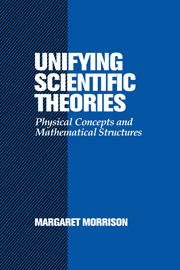Book contents
- Frontmatter
- Contents
- Acknowledgements
- Introduction
- 1 The Many Faces of Unity
- 2 Unification, Realism and Inference
- 3 Maxwell's Unification of Electromagnetism and Optics
- 4 Gauges, Symmetries and Forces: The Electroweak Unification
- 5 Special Relativity and the Unity of Physics
- 6 Darwin and Natural Selection: Unification versus Explanation
- 7 Structural Unity and the Biological Synthesis
- Conclusions
- Notes
- References
- Index
Conclusions
Published online by Cambridge University Press: 06 October 2009
- Frontmatter
- Contents
- Acknowledgements
- Introduction
- 1 The Many Faces of Unity
- 2 Unification, Realism and Inference
- 3 Maxwell's Unification of Electromagnetism and Optics
- 4 Gauges, Symmetries and Forces: The Electroweak Unification
- 5 Special Relativity and the Unity of Physics
- 6 Darwin and Natural Selection: Unification versus Explanation
- 7 Structural Unity and the Biological Synthesis
- Conclusions
- Notes
- References
- Index
Summary
One of the themes I would like the reader to take away from this discussion is that unity, either in the broader context of science itself or in the more localized settings of specific theories, cannot be uniquely characterized. More specifically, no single account of theory unification can be given. A philosophical consequence of that claim is that unity should not be linked to truth or increased likelihood of truth; unification cannot function as an inference ticket. What exactly is the connection here? Although I have tried to explicate the features necessary for distinguishing a truly unified theory from a mere combination or conjunction, even within that framework different kinds of unity can emerge. Not only can unification exhibit a variety of ontological patterns (e.g., reductive and synthetic), but the way in which the unification is achieved can have a significant impact on whether or not there is an accompanying theoretical story, an account that can be claimed to provide a plausible representation of the phenomena. For instance, in neither the early version nor the late version of Maxwell's theory was there a viable physical interpretation of the electromagnetic field; hence, any affirmation of truth with respect to the theory would need to be severely limited in its content. Even if we consider Hertz's famous claim that Maxwell's theory was Maxwell's equations, prior to 1888 there was no guarantee that those equations were descriptively accurate, because there was no proof that electromagnetic waves existed.
- Type
- Chapter
- Information
- Unifying Scientific TheoriesPhysical Concepts and Mathematical Structures, pp. 232 - 237Publisher: Cambridge University PressPrint publication year: 2000



